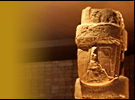Bolivian metamorphoses
Page 3 of 4
May 2008
R. and I made our first ramble outside La Paz to the ruins of Tiwanaku. Our guide-driver Carlos, that was recommended by the hotel, turned out to be a very inquisitive man. He asked more than narrated, and, frankly speaking, bored me and R. with his questions. Everything was interesting for him about Russia – from the present attitude of Russians towards Stalin, to the exchange rate of the rouble to boliviano. At the police check points Carlos used to declare in a loud voice:
– I take journalists from Russia! They will write a book about us!
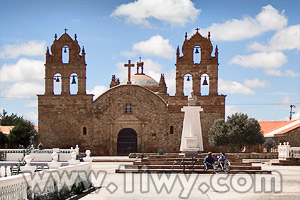
We made our first stop in the town Laja, which long ago almost became a capital of Bolivia. But later, conquistadors managed to find a more suitable place (the one, where La Paz is presently situated), and Laja, went into a lethargic sleep for centuries, where it abides till now.
We got stuck in Tiwanaku for a long time.
Two decades ago this archaeological complex was rurally cosy and accessible. At its green lawns peaceful llamas grazed grass, trustingly examining occasional visitors with their expressive eyes. The ancient ruins were awakened by a tourist boom as well as commercial interest of the people who understand that Tiwanaku is a «mine of gold». That is how «reorganisation» of the ancient complex has started.

They built a Tiwanaku museum, brought back from La Paz the «Bennett monolith», called after an American scientist that found it. The nearby to the complex town Tiwanaku literally flourished on the tourist business, although till now there is no decent «public catering». There appeared stone buildings, the square was paved, a new structure of municipality that surpasses the complex itself in solidity and impressiveness of decor was built.
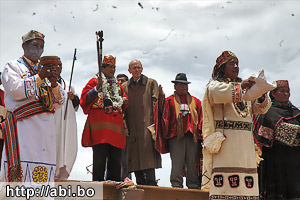
Archaeological excavations are carried out not only in Tiwanaku but also throughout the complete terrtory of altiplano. Here one can see an ideological order – it is necessary to continuously prove that Indians were the native population of these areas and that their rights for these lands are indisputable. With this background they also attack the «colonial inheritance» up to accusations of the Spanish language as a «means of exploitation». Sometimes sober-minded Bolivians (including Indians) call such attacks «the other way round racism».
As per the new draft of the Constitution the Indian population should obtain its «parallel» seven-colour «checked» flag wiphala, which existed for a long time but was not legalised. However, even now, above many administrative buildings wiphala is equally waving close to the official red-yellow-green flag of Bolivia.
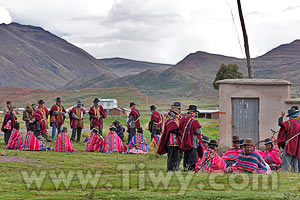
— They are called militia of Evo Morales. Red colour for Indians is special, solemn one. It is used in marriage ceremonies and at war. All «Ponchos Rojos» are mature and wise people. Their authority in the subordinate to them communities is indisputable. They are armed with old Czech and German rifles of Chaco war times. «Ponchos Rojos» helped in the past to throw down president Sanchez de Lozada, and now, at the first call of the president, are ready to move to Santa Cruz and other departments, where separatists stir up troubles. Evo Morales even stated that the armed forces and «Ponchos Rojos» would help to preserve the unity of the country in difficult times. That has enraged «advocates of autonomy» and certain military. How can one depute the authority of a regular army to illegal Indian units?
— And how was that issue solved?
— It was not. The president issued a decree on disarmament of «Ponchos Rojos» and exchange of their rifles to food. But there were no volunteers. In this, the Indian militia disobeyed Evo: «He will get convinced that we shall prove to be useful to him».
On the way back to La Paz we listened to the debatable program trying to understand: what is the nature of Evo Morales phenomenon? Why does he manage to maintain high rating of popularity in the country? Will he be able to preserve social peace in the country? Who are his real enemies?
In 1959 in the godforsaken aymara village Isallawi, in 155 kilometers from the town Oruro, a baby was born, who was named Evaristo. Then his name was changed to the aymara one – Iwu, then to Ibo, and finally to the present, known to everyone – Evo. The family lived, even as per the Indian notions, in extraordinary poverty. Evo used to recollect that once, when a boy he went with his father off in search of a living to Oruro. They were walking along the road for several days. And there ran a bright with varnish and nickel tourist bus (from another – rich life!), from which somebody threw out orange skins to the roadside. Evo picked up and ate them: «They seemed to me so tasty then».
His organisational abilities Evo displayed for the first time when he set up a village football team, that was famous for revealing fighting character even in the most losing situations. When he grew older, Evo started to do the same what everybody around was doing – growing coca. Little by little he was promoted to the trade union leaders of «cocaleros». According to the people who knew him well, Evo has «never stepped back on his principle positions and was indifferent to the good things of the well-to-do life, that is he was corruption-proof to the great grieve of his enemies».
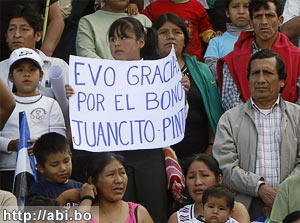
His policy in the field of energy is also constantly attacked. Morales has nationalised oil-gas deposits, enforced state control over extraction, processing and commercialisation of oil and gas in the shortest possible time. His opponents were unanimous in their predictions: the country would be punished, they would deprive us of investments, we were rolling down to economy catastrophe! But the result was different: the state treasury has increased by two billion dollars during the very first year! Should we remind that before Morales Bolivia was a «begger»: depended upon foreign credits, miserable pittance, subsidies, assistance funds and similar «philanthropy».
Industrially developed countries deliberately entangled it with an viscous cobweb of debts getting «compensations», exclusive rights for development of mineral deposits, one-sided concessions, up to direct control over the key aspects of the country vital activity. Even appointments to various governing posts in the government, armed forces and police the former Bolivian presidents used to coordinate with the USA embassy. There were different pretexts to persuade, but most often there was one and the same basis: «No persons linked with drug business should penetrate state structures».
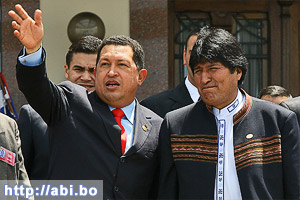
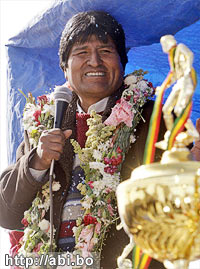
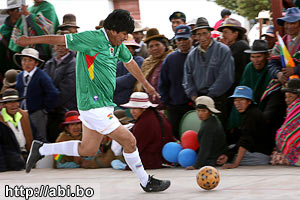
With all his busy schedule Evo finds time even for football! He was sincerely upset when the International Federation of Football Association (Federacion Internacional del Futbol Asociado / FIFA) recognised «high-altitude stadiums» unfit for conducting the championships. For Bolivia these are the fields in La Paz, Oruro and Potosi.
1. As imagined by Indians, the use of habitual clothes, no matter how worn out it is, it is a guarantee of luck and success in business. More likely, it is the explanation that E. Morales set out for his first presidential trip in an old sweater «chompa».
